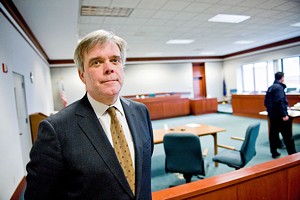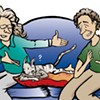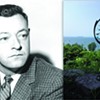Published May 14, 2008 at 11:36 a.m.
Live, local courtroom drama has it all over “Law and Order.” Television trials can’t prepare you for the initial shock of watching an accused murderer being led into a courtroom — or the fact that he looks more like a bank teller in a blue button-down shirt. Flanked by armed guards, hands and feet cuffed, Brian Rooney emerged from a side door for a pre-trial hearing last month at Chittenden County District Court in Burlington because he sent a letter to the court that sounded like a request for a new lawyer. Despite the chains restraining him, Rooney managed to maneuver an accordion file of papers onto the defense counsel table where his attorney, David Sleigh, was waiting.
Tall, fit and distinguished-looking, with a full head of gray hair, the 54-year-old attorney sat quietly as Judge Michael Kupersmith asked Rooney to explain his complaints. Sleigh’s own “trial” that day was short and sweet. Transforming the interview into a lesson in criminal defense, Kupersmith advised Rooney that his interests would be better served if he let “Mr. Sleigh” do his job. He reminded the defendant that the man sitting to his right is “one of the top criminal defense attorneys in the state. He is prepared, he is thorough, and he is aggressive.”
The judge asked Sleigh, “Are you ready to go to trial?”
“Yes, your honor,” the lawyer answered in a deep, strong voice.
More than a month after that hearing, Sleigh is as ready as he’ll ever be. For the next three to four weeks, he’ll have a starring, but by no means enviable, role in what promises to be one of the most emotional and highly publicized murder trials in Vermont history. As the accused’s attorney, Sleigh’s task is to prove there is reasonable doubt that Rooney kidnapped, raped and strangled 21-year-old Michelle Gardner Quinn, who had just transferred to the University of Vermont, in a late-night encounter on October 7, 2006. The prosecution has DNA evidence on its side and contradictory statements Rooney made while in custody.
Trying to prove Rooney’s innocence won’t be easy, or popular, but Sleigh has made his reputation by taking on tough cases. Most of them have involved protecting the rights of people who don’t inspire a great deal of sympathy: drunken drivers, murderers, prisoners, child rapists, shoplifters. Sleigh’s guiding principle? “Whether someone did something or didn’t do something is largely irrelevant . . . If the government can’t prove it, they can’t restrict the liberty. Period.”
Remember Roger Lussier, the former president of Lyndonville Savings Bank who went to jail for bank fraud? Sleigh and his law partner David Williams sued celebrity defense attorney F. Lee Bailey for malpractice on Lussier’s behalf — and won. Bailey had made a mistake in the proceedings that led to the judgment against Lussier. Sleigh has successfully represented Tasered protesters in Brattleboro, a Guantanamo prisoner, a lawyer caught in a police sting and a Jamaican man accused of rape by a 14-year-old white girl. In the case of the state versus Calvin Tracey, Sleigh convinced the judge to instruct the jurors to ask themselves: If the plaintiff were black and the defendant were white, would they deliver the same verdict? The test of conscience led to an unexpected acquittal.
“He’s very creative,” says U.S. Federal District Court Judge William Sessions III of Sleigh, who was his student at Vermont Law School.
Sleigh & Williams is one of five private Vermont law firms contracted by the state to handle serious felony cases. Vermont Defender General Matt Valerio, who assigned Sleigh the Rooney case, says not only does Sleigh have the requisite trial experience, but he’s “a great storyteller” — which goes a long way toward humanizing the defendant to the jury.
“Dave has a way of describing legal concepts like reasonable doubt and burden of proof in a way that anybody can understand,” Valerio notes.
Loren Duckman has thought a lot about what it takes to be an effective criminal defense attorney. Until recently, he was doing just that inside Valerio’s office. First he lists Sleigh’s physical attributes: handsome, good voice, presents himself well. “Then you’ve gotta have all the rules of evidence. You’ve gotta know the law. You’ve gotta be good with people. And you have to be smart on your feet,” says Duckman. “So it’s like a baseball player who can run, throw, hit, catch and understands the game . . . He’s got all the tools a great trial lawyer has, which is very rare.”
Cheryl Hanna is a Vermont Law School professor who comments on legal issues in the media, including for Seven Days. She pays Sleigh the greatest compliment a criminal defense attorney can get. “If I murdered my husband,” she says, “I’d want him to be my lawyer.”
************
Sleigh easily recalls the first inkling of his interest in law. “Eighth grade at Wilbur Junior High School in Palo Alto,” he blurts out like the smartest kid in the class. “They had a cop come in our civics class, and we had been talking about the Bill of Rights, and search and seizure. Surprisingly, the cop was very aggressive about saying, ‘Look, these are your rights. You don’t have to talk to the police if you don’t want to; that’s Miranda and blah blah blah.’ I was just taken aback.”
What Sleigh didn’t realize then — in 1967 — was that the country’s criminal defense laws were in the midst of a radical change. He notes, “All those cases were being generated by the Warren Court — I mean, Edwards v. Arizona, Miranda v. Arizona — and the whole notion of civil liberties being aggressively protected by the Constitution was flowering at the time.”
Sleigh didn’t stay long in Palo Alto. Between fifth and tenth grade, he attended six or seven schools in five different states. His father, an expert in the philosophy of science, followed research dollars and guest professorships all over the country.
He also “expected you to speak clearly at the dinner table,” Sleigh recalls with the amused resignation of a former rebel. He fought hard to keep his hair long, but concedes the old man trapped him in his own argument. “I said, ‘But Dad, I’m the same person whether I have long hair or short.’ He said, ‘Right, exactly, so go get it cut.’”
Sleigh spent his first year and a half of college at Michigan State — the family had lived briefly in the Detroit area twice — but he didn’t like it, and so followed a buddy to Macalaster College in Minnesota. He thrived there, but was no bookworm. During his junior year, Sleigh frequently dropped in on the “Wounded Knee” proceedings in nearby St. Paul, where American Indian Movement leaders Dennis Banks and Russell Means were on trial for “criminal acts” committed during the 1973 occupation at Pine Ridge Reservation. Sleigh was enthralled by defense attorney Charles Gary, who went on to defend the Chicago 8.
“I was too shy to actually go up and introduce myself; I just watched from the bleachers,” says Sleigh. “He wasn’t a flashy guy like Bill Kunstler was, but he did really serious work. He was a very persuasive guy.”
Sleigh graduated from Macalaster with a degree in philosophy and economics, and took a job as a paralegal with the law firm in Minneapolis that would later represent the Indian government against Union Carbide after the Bhopal disaster. Sleigh was put to work on one of the first cases to use computer-assisted litigation, concerning a silver mine fire in Coeur d’Alene, Idaho. Eighty-six workers died in a blaze that was exacerbated by urethane foam in the ventilation system. On behalf of the mine owners, the firm sued the chemical companies that made the stuff and promoted its use.
Sleigh spent weeks in the law office basement, “going through tons and tons of documents” until, three months before the trial began, his company asked for a paralegal volunteer willing to move to Boise for the legal proceedings. Only one hand went up: Sleigh’s. He ended up being the go-to guy for all the documents during the trial. Nicknamed “the mole,” he recalls, “My fingers were always cut up from digging through the files.”
That early experience might explain Sleigh’s facility with exhibits — “he does a lot of PowerPoint,” Duckman says. But it wasn’t until later, during his first DWI case as a public defender in Minnesota, that Sleigh realized just how important appearances can be. Post-trial interviews with jurors revealed some of them weren’t impressed with the piles of papers he stacked up all over the defense counsel table. “After that, I sort of made a vow to make sure I had things as organized as possible,” Sleigh says, “so at least I looked like I knew what I was doing.”
Sleigh got into law school at Tulane, in New Orleans, but decided at the last minute on the more sober Vermont Law. He and his brother drove from St. Paul to South Royalton, which appealed in part because it was close to the family camp on New Hampshire’s Lake Winnipesaukee. Sleigh recalls, “We drove around the town, like, four times, wondering, ‘Where is the law school?’ It was a great place for me, but it was kind of a shock that first day down there.”
Sleigh never had any interest in environmental law, for which VLS is renowned. It’s all about regulations, he says, and “I really can’t stay awake reading all that stuff.” He got his worst grades in the subject he was most interested in: criminal law. Sessions still ribs his former student every time Sleigh comes before him in federal court. But on the record, the judge calls Sleigh “an excellent trial lawyer” with a “lot of passion. I would not be shaken by the fact that he did not do so well in my class.”
************
The law firm of Sleigh & Williams doesn’t have a flashy sign on Railroad Street in St. Johnsbury — just the company name on a street-level glass door that advertises several other businesses. There’s no elevator in the historic brick building; you have to walk up a wide, old-fashioned staircase to get to the office on the second floor. With wood floors and tall windows, it’s classic Vermont. So is the camo-clad guy at the front desk asking about the details of a pending DWI. “I just don’t want to get caught with my pants down,” he confides to Julie Smith. She and Linda Pennaman assist Sleigh and Williams, who is just as active, but less flashy than his partner. The four have lunch together in the office every day.
Sleigh’s office, across from a Chinese restaurant, affords a good view of the man. He doesn’t hide his history. You can’t miss the photo that looks like an album cover from his days at Macalaster; he’s the one in the middle, with the gun. There’s a shot of his now-15-year-old son, “the issue of the first marriage.” A tight close-up of Sleigh and a young woman catches the eye. Daughter? “Fiancée,” he says without a hint of embarrassment. “I’ll be older than my mother-in-law.” The save-the-date cards for the September wedding are right next to the picture.
Other “exhibits” include a poster publicizing one of his father’s lectures at U. Mass. A baseball signed by his childhood hero, Yankees third-baseman Clete Boyer. And the defense-attorney-friendly dug nap print that asks, “If a man speaks in the forest, and no woman hears him — is he still wrong?”
Spacious and full of light, this real estate has a lot of history for Sleigh. He worked as public defender here before he started the firm with Williams, in 1991. When he graduated from VLS in 1982, Sleigh took a job covering the entire Northeast Kingdom for $16,000 a year. It earned him the distinction of being the first lawyer to arrive at the 1984 raid of Island Pond. That’s when the state, in its own version of “Yearning for Zion,” seized 112 children from a religious community on allegations of abuse. Sleigh helped process the group, now called “Twelve Tribes,” by taking depositions. Judge Frank Mahady ordered the children returned to their families and, later, in a landmark judgment, ruled the group’s civil liberties had been violated.
But DWIs were — and are — far more common in the Kingdom than cases of religious persecution. Would he call it a specialty? Sleigh laughs. “It basically has to be if you’re going to make a living in criminal defense in northeastern Vermont.” He estimates 60 percent of the cases that go to trial are DWIs. Fighting them was great training for Sleigh. “I tell younger lawyers, ‘If you can try a DWI case, you can try anything. It’s got expert opinion. You got the Datamaster. You got lay opinion. You got officers talking about intoxication. You have eyewitness identification. You have a subject that has a certain amount of built-in community antipathy . . . If you can put a persuasive defense together, you can probably handle more serious cases.’”
State Senator and Essex County State’s Attorney Vincent Illuzzi remembers trying one of those cases against Sleigh. The defendant was a 15-year-old girl whose reckless operation of a motor vehicle caused a fatality. Sleigh was her defense attorney. “He was able to convince the jury that a 15-year-old should not be held accountable,” Illuzzi explains. “In legal work, it’s called jury nullification. They say, ‘Yes, it happened, but under the circumstances, she should not be held responsible for her actions.’ He managed to find the only defense there was.”
Asked what the local cops would say about him, Sleigh says, “I think they would say that I’m fair and that I’m honest and that I can be a prick.”
Illuzzi describes Sleigh’s courtroom style as “creative” and “tough.” He actually recommended the St. Johnsbury attorney to the family of a prisoner who committed suicide in Newport. Sleigh had already tried a similar case against Correctional Medical Services in Chicago that resulted in a $1.5 million judgment for the dead prisoner’s estate. He took the Vermont case, too; James Quigley had been in solitary confinement as a result of a dispute with a superintendent who wanted to use prisoner recreation funds for a garden the inmates couldn’t access. Quigley hanged himself in a room that wasn’t properly suicide-proofed. The state settled with the family for $750,000.
Sleigh has no trouble remembering the details of his legal battles, not all of which have been successful. Three of the more challenging ones are documented on videotape on the firm’s website. One shows the acquittal of two Northfield cops accused of using excessive force against a prisoner. The other shows Lorrell Cloud — who allegedly discharged a gun in Burlington’s Old North End — walking away from second-degree-murder charges. Footage of the racially charged Tracy case referenced earlier shows the courtroom chaos that ensued after the verdict.
“I’ve had three verdicts videotaped by [W]CAX in my life, and they’ve all been acquittals,” Sleigh observes, adding somewhat sheepishly, “That may change.”
A lawyer is paid to persuade. But his pro bono work reveals what he really believes in. Sleigh volunteered to represent fellow attorney Eileen Hongisto when a police detective tried to extract information from her by posing as a witness against one of her clients. It was so “egregious,” Sleigh says, he asked the Vermont Association of Criminal Defense Lawyers to write an amicus brief joining him — “just to give gravitas to our position that this was something defense attorneys were alarmed about, and it wasn’t just crazy Dave up in the Northeast Kingdom. They assured me they would, and they never did.”
When the court ruled in Hongisto’s favor, Sleigh wrote a letter to the president of the VACDL. He recalls it verbatim: “I would like to thank the association for all the help they gave me in securing the win in the Hongisto case. Unfortunately, I can’t, ’cause you didn’t. Sincerely, Dave.”
************
Sleigh can’t say a word about the Michelle Gardner Quinn case — Judge Kupersmith imposed a gag order after an FBI agent working on the investigation wrote about it in Seven Days.
But Sleigh can talk about his socks. He bought all new ones for the trial, he reveals, pointing to a plastic package next to his office door. Nothing like a little retail therapy to get you psyched for the spotlight. Music, too, plays a part in Sleigh’s preparation. “Before every jury trial,” he says in that sonorous voice, “I play Jefferson Airplane’s ‘Volunteers of America’ full blast.”
Leading up to the trial, Sleigh hasn’t missed an opportunity. He took full advantage of the FBI agent’s 2006 gaffe — first using it to argue that all charges against Rooney should be dropped. When that didn’t work, he used the piece to support his assertion that Rooney could never get a fair trial in Chittenden County.
But the change of venue — to Rutland — won’t change what Sleigh is up against. Talking about “serious trials” in general, he suggests, “Look at the state side: three or four lawyers, two investigators in their office specially assigned, the department of public service, the state police, the forensic labs, the FBI labs — they have all those resources. And the poor accused is there with me. I mean, it’s daunting.”
How the court handles Rooney’s conflicting statements to police will determine what Sleigh has to work with. “The whole goal of a defense attorney is to limit the amount of info that goes into evidence,” Illuzzi notes. Sleigh is also likely to question the veracity of DNA findings, or argue that Quinn had consensual sex with Rooney and was murdered by someone else, as unsuccessfully claimed by the defendant in the recently resolved Patricia Scoville case.
Sleigh got his first crash course in the science of DNA testing back in 1995, by challenging its admissibility in a state case against Bruce Batchelder, who was convicted of a double murder. Sleigh and another guy from the firm went from zero knowledge to weeks of cross-examining some of the nation’s experts in the field. “We had to understand it well enough ourselves to make the questions meaningful to someone who didn’t know anything about it” — the judge. Sleigh lost the motion, but recalls it was probably the best work he’s ever done. DNA testing has come a long way since then, which is no doubt why there’s a clean copy of Forensic DNA Testing on his desk.
Surviving the trial takes at least as much energy as does cramming for it. Sleigh will stay in Rutland for the duration, in a motel. “After about three and a half days, my clock is completely flipped around. Some lawyers stay up until midnight to get ready for the next day. I’ll probably go to bed at 6 o’clock and get up at 3 o’clock in the morning and work. If you get four or five hours of sleep a night, that’s great.” Along with his case files, Sleigh plans to bring his rowing machine — he skulls on the Connecticut River — and a bottle of 16-year-old Lagavulin Scotch.
The state pays his expenses, but the legal fees are covered by the contract he has with the Vermont Defender General’s office. The firm of Sleigh & Williams receives $105,000 a year to handle serious felony cases, whether they’re pled out or tried before a jury. Sleigh laments the precipitous drop in the number of trials, which he interprets as people’s “growing trust in authority, which I think in the long run is bad news.” He views jurors as “the buffer between uncontrolled government discretion and the alternative.”
Sleigh likens his courtroom performance to a sales pitch. “The art of it is to be sufficiently versed in the facts, and theory of your defense, that you stay on message . . . You have to have a theme, and you have to stick to it, and you have to try to marshal information so that it’s arguably consistent with what it is that you’re trying to sell,” he explains. “When I’ve taught trial practices, I say, ‘Get over yourself. You’re a salesman, and you’ve gotta sell a story just like somebody who sells a Fuller brush.’”
This persuasive zeal leads to a phenomenon Sleigh calls “trial delusion.” A lawyer can get so wrapped up in his own argument, he says, it’s easy to believe everyone else must also be convinced.
In the end, all it takes is one doubting juror, and people do tend to be impressionable. For example, Sessions has observed that jurors tend to be very attentive to the relationship between the attorney and the accused. “They are always asking themselves, ‘Does the defense lawyer really believe the client? Does he or she really like the client?’ . . . If the jurors really believe the lawyer is committed to the client, that goes a long way to persuading people.”
Sleigh describes himself as more of a “technician” when it comes to attorney-client relations. “I don’t involve myself greatly in their personal lives or personal opinions — just as a matter of tactics,” he says. “I think most people who have handled serious cases for any length of time, probably the last thing you ask is, ‘Why don’t you tell me what happened?’
“I’m only interested in one thing: the quantum and character of the state’s evidence to prove their allegations,” Sleigh concludes. “It’s much more challenging as a professional to be on the defense side, to take something that looks obvious and indisputable and be able to infuse that with sufficient doubt that 12 jurors will wonder whether their preconceived notions are supported by the evidence.”
More By This Author
Speaking of...
-

Best rock artist or group
Aug 1, 2018 -

Opinion: Should Rape Victims Get Custody Rights?
Feb 26, 2014 -

At the Junction of State and Federal Law, I-91 Checkpoint Becomes Site of Legal Collision
Feb 5, 2014 -

Maple Makeover? Vermonters Discover a New Sugaring Technique
Feb 5, 2014 -

Disharmony on Prospect Street: A Dispute Between Neighbors Strikes a Sour Note
Feb 5, 2014 - More »
Comments
Comments are closed.
From 2014-2020, Seven Days allowed readers to comment on all stories posted on our website. While we've appreciated the suggestions and insights, right now Seven Days is prioritizing our core mission — producing high-quality, responsible local journalism — over moderating online debates between readers.
To criticize, correct or praise our reporting, please send us a letter to the editor or send us a tip. We’ll check it out and report the results.
Online comments may return when we have better tech tools for managing them. Thanks for reading.














































